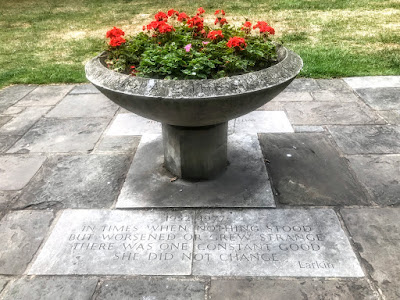‘A serious house on serious earth it is’ (Philip Larkin) … Saint Michael’s Church, Greenhill, Lichfield (Photograph: Patrick Comerford)
Patrick Comerford
Earlier this week, I was marking the 100th anniversary of the birth of the poet of Philip Larkin (1922-1985) by recalling the time he spent in Lichfield during World War II.
The Larkin family lived in Coventry, and Philip Larkin was born 100 years ago on 9 August 1922. But the family roots were Lichfield, dating back to 1757, and while he was an undergraduate at Oxford, the Larkin family moved to Lichfield during the Coventry Blitz.
Larkin spent some time in Lichfield, staying at 33 Cherry Orchard, Lichfield and at 9 Sturgeon’s Hill, and wrote at least three poems in Lichfield, Christmas 1940, Out in the lane I pause and Ghosts.
When my blog posting on Philip Larkin was reposted on a Lichfield Facebook group earlier this week, one Facebook friend, Jayne Preston, recalled, ‘I used to deliver newspapers here year ago as a teenager. Can remember speaking to an elderly lady there who told me about a royal poet laureate. Would this be Philip?’
Yes, Philip Larkin lived there over 80 years ago – but he never was Poet Laureate. In fact, he declined the invitation to became Poet Laureate following the death of Sir John Betjeman.
Many felt Larkin should have been offered the position of Poet Laureate in 1972, but Betjeman was preferred instead. By the time Betjeman died in May 1984, Larkin was only months from his own death, and could only decline the position when it was offered to him. Instead, Ted Hughes became the Poet Laureate.
Hughes and Larkin were both published by Faber and Faber, but never saw eye-to-eye. Close to the former Faber and Faber offices at No 3 Queen Square, lines from Ted Hughes and Philip Larkin are inscribed below a floral bowl commemorating Queen Elizabeth II’s Silver Jubilee of 1977.
Ted Hughes wrote:
A nation’s a soul
A soul is a wheel
With a crown for a hub
To keep it whole
Philip Larkin wrote:
In times when nothing stood
But worsened or grew strange
There was one constant good
She did not change
Having declined the position of Poet Laureate, Larkin wrote wistfully to Kingsley Amis: ‘the thought of being the cause of Ted’s being buried in Westminster Abbey is hard to live with.’
Larkin called himself ‘an agnostic, I suppose, but an Anglican agnostic, of course.’ Yet he too eventually joined Betjeman and Hughes with a place in Poets’ Corner in Westminster Abbey in 2011.
As well as declining the honour of Poet Laureate, a recently discovered letter in Saint Hugh’s College, Oxford, shows that Larkin also ruled himself out of consideration for election as Professor of Poetry at Oxford in 1968. In a letter to a colleague, Larkin said he dreaded the post’s ‘sherry-drill with important people’ and that he would be ‘entirely unfitted’ for the job.
The position is seen as the second most important in British poetry behind that of Poet Laureate.
The letter, typed on Larkin’s letterhead at the University of Hull’s Brynmor Jones library, replies to a suggestion from the then college principal, Rachel Trickett, that he should stand for the prestigious role. After ‘the luxury of a few minutes day-dreaming on the subject,’ he wrote to dissuade her from putting his name forward.
He added that he had given just one lecture in his life. ‘I hated it, and a number of people walked out in the first few minutes,’ he said. ‘My idea of hell on earth (physical pain excepted, and I am not sure that it is excepted even in this case) is a literary party, and I have an uneasy feeling that the post carries with it a lot of sherry-drill with important people.’
Larkin was nominated again by WH Auden, in 1972, only to decline once again.
His comments about ‘sherry-drill link to his sardonic poem Vers de Societé, in which he writes:
I could spend half my evenings, if I wanted,
Holding a glass of washing sherry, canted
Over to catch the drivel of some bitch
Who’s read nothing but Which
Lines from Philip Larkin commemorate Queen Elizabeth II’s Silver Jubilee of 1977 in Queen Square, London (Photograph: Patrick Comerford, 2022)
Despite his agnosticism or atheism, Larkin loved the country churches that knit the English landscape together. He spent a week back in the Midlands in 1954, mainly with his mother, when he visited ‘family graves’ in Lichfield around February or March 1954, including the grave of his father, Sydney Larkin, who was buried in Saint Michael’s Churchyard in 1948.
In a letter written in March 1954, Larkin says this visit to Saint Michael’s churchyard was followed by a ‘queer mixture of hell and rest cure’ – by this he meant a poorly attended service in Lichfield Cathedral.
Larkin described ‘Church Going’ as his ‘Betjeman poem.’ Although he later said it was inspired by a country church near Belfast, it may indeed have been inspired by that visit to Saint Michael’s in Lichfield with his mother in 1954, as I have suggested two years ago (HERE).
I ‘run my hand around the font’ (Philip Larkin) … the font in Saint Michael's Church, where generations of the Larkin family were baptised (Photograph: Patrick Comerford)




No comments:
Post a Comment